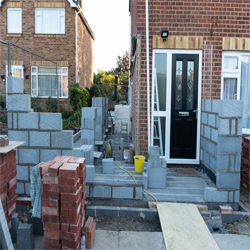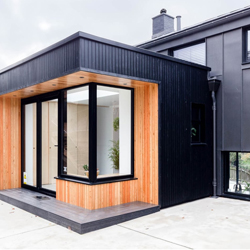Is It Better to Move House or Extend? (Tips From Homeowners)

It is common for homeowners or tenants to upgrade their houses after a while. However, with increasing house prices, homeowners may wonder what is better between extending and moving from their homes. You should weigh your options to make a decision that will not negatively impact your finances.
An extension may increase your home’s value, but moving allows you to live in a new environment.
So, should you extend or move to a new house? Keep reading this article that will help you make a decision that suits your needs.
The Facts
Forty-one percent of people in the UK preferred to extend their houses rather than move after the government revised the Permitted Development Rights. These regulation changes have shifted people’s perceptions on building an extension, with 19% of homeowners now interested in extending their homes in the next three years. [1]
It depicts that fewer people will likely relocate from their homes.
Is Extending Your House a Better Option?
Extending your house may be a good investment once you sell it. However, this is not guaranteed as many factors are considered when selling a home; they include the location, demand, and the house’s current value.
The best way to make this decision is to evaluate the building costs involved.
Building Costs Involved When Extending a House
The table below highlights the average cost of extending a single-storey house in the UK. These prices will differ depending on the size and location of your home. The VAT has also not been included in the tabulation.
| Extension Services | Price |
| Extension Per Square Metre | £1,500 – £2,000 |
| Planning Permission | £190 – £206 (extending more than 3m from the original property) |
| Property Survey Fees | Beginning at £400 |
| Architect Fees | (Usually 3-10% of the extension cost) so, approximately from £2,700 to £4,000 |
| Building Regulations Checks | Usually, 10% of the extension cost |
You will also need a party wall agreement if the extension intrudes on your neighbour’s land because you must ask them for permission before proceeding with the construction. [2]
Extending a two-storey house will be approximately double the cost of extending a one-storey home.
Are There Extensions That Increase Your Home’s Value?
You can add different types of extensions to your house to improve it. However, you must know which ones are worth your budget and effort to avoid overspending.
Here are some examples of extensions that may increase your house’s value.
 1. Single-Storey Extension
1. Single-Storey Extension
A single-storey extension is perfect if you want an extra living space. This extension is ideal for those with a growing family who want their children to have extra space.
One advantage of a single-storey extension is that you can do it with a smaller budget. You only have to reduce your plan size to work with your budget. This extension may increase your home’s value by 5% to 10%.
2. Loft Conversion
The loft conversion project may cost you approximately £1,000 per square metre. However, this price is not fixed as it depends on your current location, your preferred design, and the construction agency you hire. [3]
One benefit of this home extension is that it eliminates the chaotic disturbance of building work.
Converting your loft into a bedroom or bathroom may increase your home’s value by 12.5%.
Are Planning Permissions Required for an Extension?
One does not require planning permissions for an extension, provided it is within the permitted development rights. [4]
You will need planning permission if:
- The extension materials used will differ from the original house.
- The extension will be higher than the main house.
- The side extension will be wider than half the width of the main house.
- The extension will cover more than half of the surrounding land.
However, there are situations where you can have restricted permission development rights. They include:
- If you stay in a maisonette.
- If you are starting a new project where the plan is bigger than your current property.
Other than these limitations, you may have permitted development rights, but you should research and consult an expert before commencing the work.
Pros and Cons of Extending
 Extending your house is a process that takes time. Your home will become a construction site in the interim, which can be strenuous for your family. You will also incur extra costs during construction as you wait for completion.
Extending your house is a process that takes time. Your home will become a construction site in the interim, which can be strenuous for your family. You will also incur extra costs during construction as you wait for completion.
However, extending your house is an investment option that may pay off after selling it, but it is not guaranteed. If you’re looking for an answer to “should I extend or move?”, extending is suitable if you plan to stay at your current property for a long time.
Is Moving From Your House the Best Option?
As discussed, building an extension can be strenuous and may be expensive. Some extensions may increase your home’s value, but it is not the only determining factor when selling your house.
The other option is to move to a different house, especially if you want a home with additional features like a garage. Knowing the costs involved is the best way to determine if moving is the right choice for you.
See related post: When Is The Best Time Of The Year To Move House?
Expenses Involved When Moving
The table below depicts the costs of buying and selling a house worth £251,000 in the UK. These prices are not fixed since they vary based on the property’s location, size, and design.
| Moving House Service | Price |
| House deposit | £30,000 (Normally 15% of the house’s value) |
| Property survey costs | £500 |
| Attorney’s fees for buying a house | £1,000 |
| Attorney’s fees for selling a house | £1,040 |
| Estate agent fees | 1-3% of the value |
| Average removal company cost | £1,181 |
Remember these figures do not include the stamp duty cost, which is part of the expenses incurred when relocating to a new house. [5]
On average, expect to pay £30,000 for the house deposit to commence the moving process.
Related post: 10 Costs of Moving a House That You Need to Watch Out
Pros and Cons of Moving
Moving can be stressful because you will uproot your family from a familiar place to a new area where they must make new friends and attend a new school.
However, moving to a bigger house within your local area may, in some circumstances, be cheaper than extending and more convenient for your family.
Related article: 6 Reasons Why Moving Houses Is So Stressful
If you are looking to do house removal. Check these services:
Conclusion
The decision to extend or move depends on your situation.
For instance, extending your house is the best choice if you plan on living in your current house long-term. In contrast, moving to a new house is better for those who want to experience a new area and meet new people.
You should consider your family’s preferences and evaluate your long-term and short-term goals before choosing the best-fit option.
If you decide to do a house move, call Transport Executive at (44) 2033 184 720 for a free quote!
Resources:
1. https://www.everest.co.uk/planning-permission/do-you-need-planning-permission-for-an-extension/
2. https://www.fmb.org.uk/find-a-builder/ultimate-guides-to-home-renovation/party-wall-agreements-what-you-need-to-know.html
3. https://en.wikipedia.org/wiki/Loft
4. https://www.gov.uk/government/publications/permitted-development-rights-for-householders-technical-guidance#:~:text=Details,of%20the%20works%20carried%20out.
5. https://www.investopedia.com/terms/s/stampduty.asp


 1. Single-Storey Extension
1. Single-Storey Extension